This is What A-Tractored Her To Me!
Berlin (Google Maps location)
October 3, 2010
This museum is open only at the Berlin Fair
As many of you know, I’m not from these parts. In addition to not having grown up with town agricultural fairs (and frankly not really understanding their appeal), it has taken me many years to overcome my Delaware/Philadelphia/Maryland accent. It’s funny that my post-college girlfriend and then my post-college girlfriend girlfriend who is now my wife both hated my accent so much that they broke me of it. One of their shared most hated words of mine was “water” which I used to pronounce as “wooderr.” It was only after ten years of asking for a glass of “wooderr” at restaurants, and not being understood though. I figured I should probably start trying to say “wahter.”
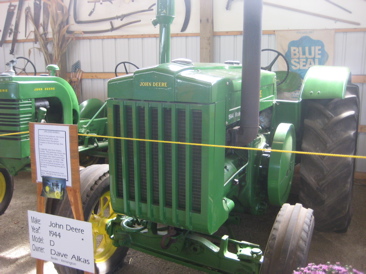
Of course, this meant I also used to say “Wooderrburee” with the “bu” part sounding more like “boo” then “bare.” Throw in my “Philelphia/Balmore” mumble, and the resulting “Wooderbu-ee” would annoy the heck out of everyone. Anyway, I don’t know if it was an accent thing any more than a “not from around here” thing, but I still have a hard time stressing the right syllable in “Berlin.” Apparently, I always say that wrong too – I just asked my wife and she says it’s “BER-lin” and that I say “ber-LIN” which is apparently okay for Germany and not Connecticut.
(Sidenote: props to Connecticut for pronouncing the ‘h’ in our Thames River as opposed to those snooty Brits.)
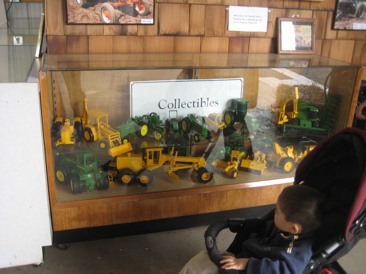
Why all this backstory nonsense? One, because you know how much people just loooooove talking about accents and two, because I haven’t too much to say about this museum. Which is a shame, because the Berlin Agricultural Lions Museum at the BER-lin Fair is only open 3 days per year and you’d think that cache alone would be cool enough to write about it for days.
But it’s not. It’s just a barn full of old tractors. Some really old and well-preserved tractors, sure, but still just a bunch of old tractors.
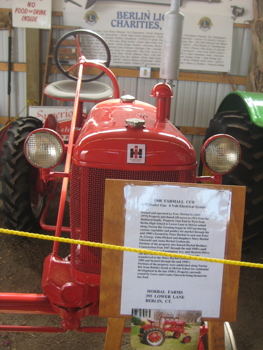
Even before we went to this museum, we had already checked out the Berlin Historical Society Museum at the Berlin Fair. And what the heck, I also have a separate page about the BER-lin Fair itself, right here. And you can see the joyous joy on Hoang’s face as we prepared to enter this particular museum:

Actually, she was probably just mad that her husband could enjoy a nice Sam Adams to help smooth out the whole fair experience but she couldn’t due to being pregnant and all. And Damian, for his part, had already quit walking and was enjoying the ride. When he saw there would be Lions here, he perked up a bit and I didn’t have the heart to tell him the difference between these Lions and, well, lion lions.
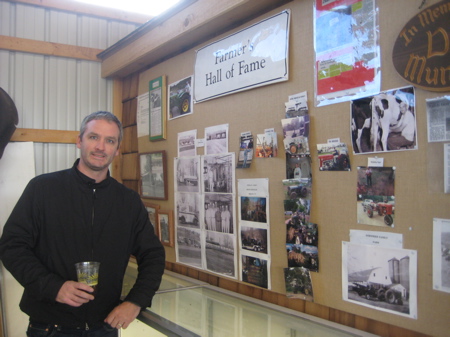
The museum started off pretty cool with a large collection of John Deere collectible toys. Look at Damian! He even sort of sat up to check them out! From there, we spent some time over at the “Farmer’s Hall of Fame.” I can’t really tell you anything about it other than my apparent glee at learning about these highly worthy farmers was more due to that half-empty beer in my hand than anything important.
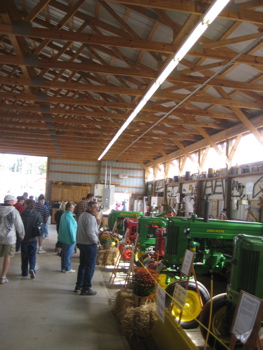
From that point forward, it was just a few long rows of old tractors. I was thinking about their mint condition and how weird that is. After all, the whole point of being a tractor is to rumble through dirt and mud for years. I would think “real” tractors would totally goof on these pretty boys. Oh look, here’s a beautiful 1941 International Model A! One of the owners is Grandpa Chatlas! Anytime I see words with a healthy dose of vowels, I think about anagrams. They make the world a much more interesting place. Like Grandpa Chatlas here, bless his tractor-loving heart, can be anagramized into “Handcart Gal Spa.”
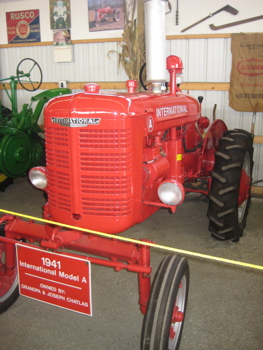
I don’t know about you, but if these tractors could become Handcart Gal Spas, I’d probably pay more attention. Also, being a fan of science in general, the anagram “Pascal Had Grant” shows promise, but I moved along when I came up with “Drags anal patch,” though I don’t want to know what that means.
To be fair, there were some nicely beat down old tractors here as well. Check out these brutes:
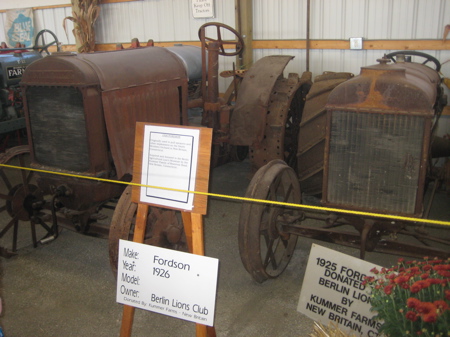
But my favorite old thing here is below, a 1926 Cletrac. It’s just so… so tough looking. Like a little bulldozer. I liked it enough to look up some info about it.
Contests between machines kept Cletrac in the public eye. An armored tank and a Cletrac vied in a competition held on “the roughest land and steep banks” near Lake Superior. According to Farm Implements & Tractors, the Cletrac driver “went everywhere the tank went, and then took to the ice-covered slopes and left the tank behind…
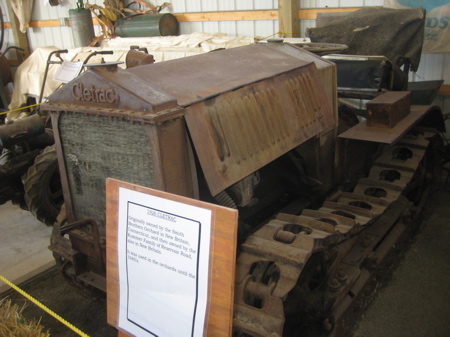
Every tractor company tried to show how easy its equipment was to use, and Cletrac was no different. In a photo printed in Farm Implements & Tractors, an 11-year-old boy shown driving a Cletrac was called an experienced hand. “During the past season (Honore Griffen) took care of 40 acres of oranges on rocky bench land without damaging a single tree,” the caption read, “and saved his father upwards of a thousand dollars in labor alone.
And really, that’s about it for this place. It was very nicely set up and the tractors were presented well. Many of them had placards about where they worked rather than anything about the tractors themselves – which I actually found endearing. And I’m sure BER-liners found those sort of oral histories even more interesting.
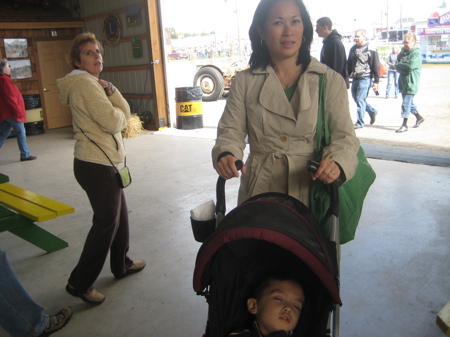
Pretty much sums it up.
My visit to the Berlin Historical Society Museum at the Berlin Fair
The Berlin Historical Society Museum
The Berlin Fair

 Peter says
Peter says
April 12, 2012 at 5:25 pmBerlin used to be pronounced like the German city. Upon the outbreak of World War I, however, German place names became unpopular in the United States and some were changed (sounds silly today, but then again would you want to live in Teheran, Connecticut or Damascus, Massachusetts?) Anyway, the people in Berlin considered changing the town’s name, but decided that would be too much of a hassle, so they just modified the pronunciation.
 Lorraine Stub says
Lorraine Stub says
June 13, 2012 at 10:16 pmAlthough the theory sounds plausible, I don’t believe it to be true. My grandmother, who died in 1988, grew up in Berlin, CT long before World War I and she said the accent was always on the first syllable, BERlin and not BerLIN.